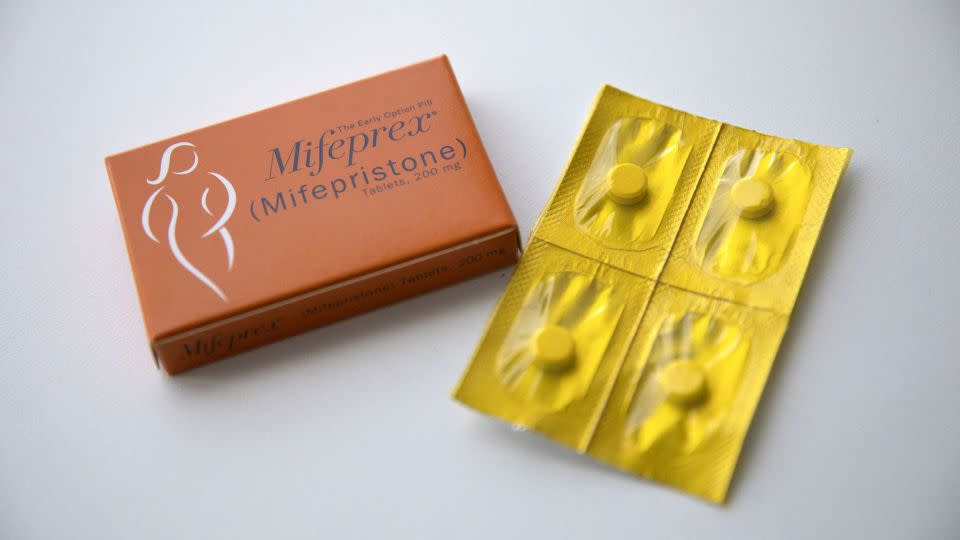Louisiana is first state to classify abortion drugs as controlled dangerous substances after GOP governor signs bill into law

Louisiana Republican Gov. Jeff Landry signed a bill Friday classifying the abortion-inducing drugs misoprostol and mifepristone as Schedule IV controlled dangerous substances, a first-of-its-kind law that places them in the same category as narcotics and depressants.
“Requiring an abortion inducing drug to be obtained with a prescription and criminalizing the use of an abortion drug on an unsuspecting mother is nothing short of common sense,” Landry said in a statement posted on X. “This bill protects women across Louisiana and I was proud to sign this bill into law today.”
Under the law, which took effect with the governor’s signature, it is now a crime to possess the abortion medication without a prescription, as well as to give the drugs to a person without their consent.
While proponents of the legislation say that it will protect expectant mothers, hundreds of health care providers in the state have come out against the reclassification, warning that it could create false perceptions around the medications’ safety and prevent people from accessing necessary care. While abortion is already banned in Louisiana with no exceptions for rape or incest, mifepristone and misopristol have other medical uses, including miscarriage care.
Anyone found in possession of the drugs without a valid prescription could face a felony charge punishable with up to five years in prison and fines of up to $5,000. Pregnant women in possession of mifepristone and misoprostol for their own consumption are exempt from such penalties. Louisiana doctors are also permitted under the law to prescribe the drugs.
A conviction in Louisiana for distribution or possession with intent to distribute Schedule IV drugs carries a penalty of up to 10 years in prison and fines of up to $15,000.
In a medication abortion, mifepristone blocks the hormone progesterone, which is needed for a pregnancy to continue. Misoprostol is then taken within the next 24 to 48 hours. Misoprostol causes the uterus to contract, causing cramping and bleeding. Approved for other uses, such as miscarriage management, inducing labor, and preventing stomach ulcers, the drug has been available at pharmacies for decades.
As the bill made its way through the state’s legislature, its critics argued that mifepristone and misoprostol are not dangerous and do not require the same level of regulation as Schedule IV substances.
A group of nearly 270 Louisiana physicians, health care providers and medical students signed a letter to the bill’s sponsor, state Sen. Thomas Pressly, expressing concerns over the reclassification. They argued that “neither mifepristone nor misoprostol have been shown to have any potential for abuse, dependence, public health risk, nor high rates of adverse side effects.”
Pressly, who proposed the legislation after he said his sister was given misoprostol against her will, has argued the legislation would not prevent the prescribing or dispensing of the drugs “for legitimate reasons.”
“The doctors I have consulted with feel this provision will not harm healthcare for women,” Pressly, a Republican, said in rebutting the letter.
CNN has reached out to the governor’s office and Pressly’s office for comment.
Medication abortion, which makes up the majority of abortions obtained in the United States, emerged as a national political flashpoint after the Supreme Court’s overturning of Roe v. Wade in 2022. The Supreme Court is currently considering a major case that challenges the FDA’s approval of the drug mifepristone, with a decision expected by July.
A White House spokesperson told CNN the administration is “very concerned” about efforts to restrict access to mifepristone.
“Make no mistake: these laws are not driven by concerns over women’s health,” the spokesperson said. “This is about coming after women’s right to access reproductive health care since Roe v. Wade was overturned—with devastating effects on women’s health and lives that we’ve already seen in Louisiana and other states across the country.”
This story has been updated with additional developments.
CNN’s Samantha Waldenberg, Shawn Nottingham and John Bonifield contributed to this report.
For more CNN news and newsletters create an account at CNN.com


